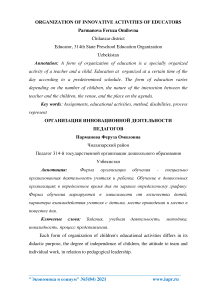Organization of innovative activities of educators
Автор: Parmanova F.O.
Журнал: Экономика и социум @ekonomika-socium
Рубрика: Основной раздел
Статья в выпуске: 5-1 (84), 2021 года.
Бесплатный доступ
A form of organization of education is a specially organized activity of a teacher and a child. Education at organized at a certain time of the day according to a predetermined schedule. The form of education varies depending on the number of children, the nature of the interaction between the teacher and the children, the venue, and the place on the agenda .
Assignments, educational activities, method, disabilities, process represent
Короткий адрес: https://sciup.org/140259242
IDR: 140259242
Текст научной статьи Organization of innovative activities of educators
Each form of organization of children's educational activities differs in its didactic purpose, the degree of independence of children, the attitude to team and individual work, in relation to pedagogical leadership.
The individual form of organization of children's educational activities reflects a number of positive aspects: the possibility of full individualization of the content, method and pace of educational activities, as well as every action of the learner in solving a specific problem and such as allowing them to monitor their operations. However, the individual form of education is different
There are also disadvantages: time-saving (if there are twenty children in a group, the teacher spends 20-25 minutes for each of them. This means that the teacher spends about six hours on individual training); limited influence of the educator (the educator's task is to give the child a task and check its implementation); limited ability to work with other children (which negatively affects the process of socialization); lack of teamwork experience.
However, sometimes it is necessary to use an individual form of learning. First of all, there is a need to work individually with children with developmental disabilities, to help them acquire the necessary knowledge and skills, to develop the ability to manage mental processes. Individual lessons are also required for children with special skills (drawing, singing, math).
With each child in the group, the educator conducts individual sessions with periodic follow-up descriptions to periodically identify gaps in his or her level of education, knowledge, and skills acquisition.
The group form of organizing children's learning activities requires small group activities. To do this, the group is divided into small groups of no more than six children. Grouping can be done according to the children's own interests and common interests, but it is not recommended to divide them into groups according to their level of mastery. Instead, it is better to form a group with children with a high level of mastery and children with a low level of mastery.
The technology used to organize work in small groups can also vary. Sometimes classes are held in small groups at once. In this case, the educator should think about the order in which the children will be placed. Each group member should sit comfortably next to each other, taking into account the distance between them. Because in group work, small group members interact with each other and work together on tasks. Therefore, it is not always possible to maintain peace in such exercises. Assignments can be given to everyone in the same way or individually. The session ends with a unique presentation of the assignment.
There is a special need for a mass (frontal) form of organization of children's educational activities in modern MTC. The mass form of the lessons can often be artistic. M: music lessons, performances, tours, art tours, etc. In such activities, the "emotional impact" that stimulates mental activity is effective, allowing the child to express himself.
"Экономика и социум" №5(84) 2021
Список литературы Organization of innovative activities of educators
- SH.A Sodikova "Preschool pedagogy" textbook T.: "Science and technology", 2012
- Negaeva V.G. "Preparation of preschool children for work", Tashkent 1985.
- Loginova V.I. "Pedagogy of preschool education", Tashkent, Teacher, 1991.
- Khalizova NB, Kurogkina NA, Pantyukhina GV, "Making toys from clay and plasticine in kindergarten" Tashkent, Teacher 1991.


